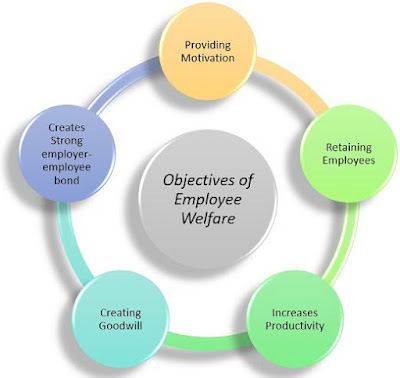The Importance of Employee Welfare
Why Important of Employee Welfare
Strategies for Enhancing Organizational Welfare
- Competitive Compensation and Benefits: Ensure that employees receive fair compensation and benefits packages that are competitive within the industry. This includes salary, healthcare, retirement plans, bonuses, and other perks.
- Work-Life Balance: Promote a healthy work-life balance by offering flexible work arrangements, such as remote work options, flexible hours, or compressed workweeks. Encourage employees to take breaks and vacations to prevent burnout.
- Professional Development Opportunities: Invest in employee development through training programs, workshops, seminars, and tuition reimbursement. Provide opportunities for advancement and career growth within the organization.
- Recognition and Rewards: Implement a system for recognizing and rewarding employees for their contributions and achievements. This could include employee of the month awards, performance bonuses, or public recognition during meetings
- Open Communication: Foster a culture of open communication where employees feel comfortable sharing their ideas, concerns, and feedback. Encourage regular one-on-one meetings between managers and employees to discuss progress, goals, and any challenges they may be facing.
- Employee Wellness Programs: Offer wellness programs that promote physical and mental well-being, such as gym memberships, yoga classes, counseling services, or mindfulness training. Provide resources and support for maintaining a healthy lifestyle.
- Diversity and Inclusion Initiatives: Create a diverse and inclusive workplace where employees from all backgrounds feel welcome and respected. Implement policies and practices to prevent discrimination and promote equal opportunities for advancement.
- Social Responsibility Initiatives: Engage employees in corporate social responsibility initiatives, such as volunteer programs, charity events, or sustainability efforts. This can help foster a sense of purpose and pride in the organization.
- Flexible Work Environment: Design a comfortable and conducive work environment that meets the needs of employees, whether they prefer open office spaces, private workstations, or collaborative areas. Provide amenities such as break rooms, wellness rooms, or quiet zones.
- Employee Assistance Programs (EAPs): Offer EAPs to provide support for employees facing personal or professional challenges, such as counseling services, financial planning, or legal assistance.
Encouraging employee well-being has several advantages for employers. Organizations can foster a happy and productive work environment by placing a high priority on the physical, emotional, and professional well-being of their employees. Employee engagement, productivity, and job happiness all rise when workers feel appreciated, supported, and encouraged to give their best work. Furthermore, putting an emphasis on worker welfare can lower absenteeism and turnover rates, which can save the company money. Furthermore, organizations that place a high priority on employee welfare are more likely to draw in and hold onto top talent, which strengthens their standing as top employers. Organizations may foster a work environment where people flourish, improve team chemistry, increase recruitment efforts, and maintain regulatory compliance by making investments in employee welfare. In the end, putting employee welfare first is not just advantageous.
conclusion
Putting employee wellness first is not just the right thing to do, but it's also a smart business move with long-term advantages. Organizations may foster a healthy work environment where people flourish and give their all by funding programs that promote the physical, mental, and emotional wellness of their workforce. Increased output, more job satisfaction, lower absenteeism and attrition rates, better recruiting and retention strategies, better team dynamics, and a strong employer brand reputation are all advantages of employee wellbeing. In the end, companies that put employee welfare first are more likely to succeed in the long run because they cultivate a culture of engagement, loyalty, and resilience among their workforce. As a result, making investments in employee wellness is not just the moral thing to do, but also a wise move for the organization's future.
Reference
- Olufunmilayo F. Odeku(2015)IMPORTANCE OF THE WELFARE FACILITIES IN THE WORKPLACE: ISSUES IN PERSPECTIVES, Researchgate artical,pg 23.-34
- Sabil Sabil,lukmen hakim (2023).The Role of Employee Welfare in Improving Work Productivity in Service Companies,Researchgate artical





The significance of employee wellbeing is important in its capacity to cultivate a favorable work atmosphere, increase employee spirits and overall welfare, and eventually improve productivity, retention, and organizational culture.
ReplyDelete